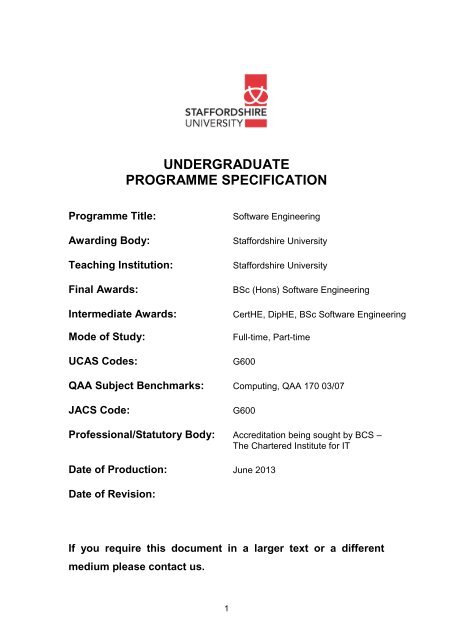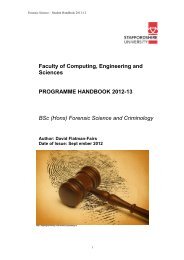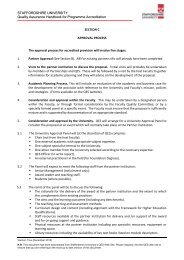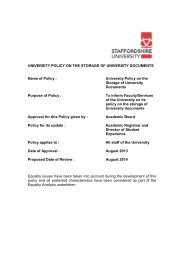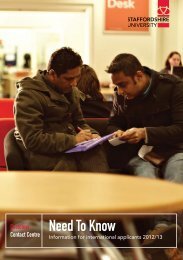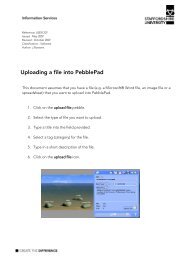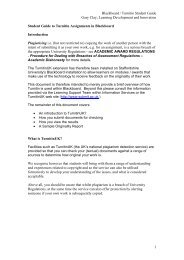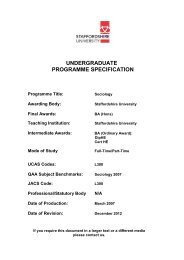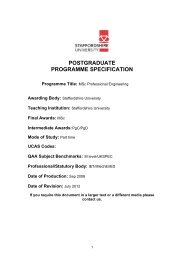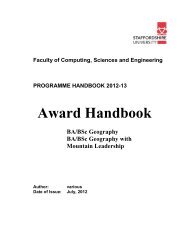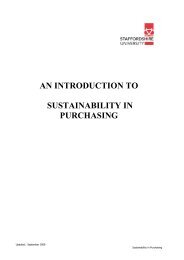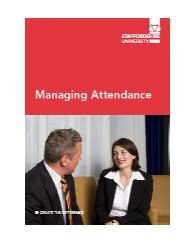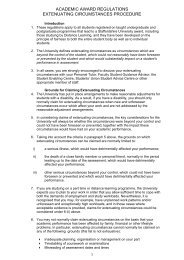Software Engineering Programme Specification - Staffordshire ...
Software Engineering Programme Specification - Staffordshire ...
Software Engineering Programme Specification - Staffordshire ...
You also want an ePaper? Increase the reach of your titles
YUMPU automatically turns print PDFs into web optimized ePapers that Google loves.
UNDERGRADUATE<br />
PROGRAMME SPECIFICATION<br />
<strong>Programme</strong> Title:<br />
Awarding Body:<br />
Teaching Institution:<br />
Final Awards:<br />
Intermediate Awards:<br />
Mode of Study:<br />
UCAS Codes:<br />
<strong>Software</strong> <strong>Engineering</strong><br />
<strong>Staffordshire</strong> University<br />
<strong>Staffordshire</strong> University<br />
BSc (Hons) <strong>Software</strong> <strong>Engineering</strong><br />
CertHE, DipHE, BSc <strong>Software</strong> <strong>Engineering</strong><br />
Full-time, Part-time<br />
G600<br />
QAA Subject Benchmarks: Computing, QAA 170 03/07<br />
JACS Code:<br />
G600<br />
Professional/Statutory Body: Accreditation being sought by BCS –<br />
The Chartered Institute for IT<br />
Date of Production: June 2013<br />
Date of Revision:<br />
If you require this document in a larger text or a different<br />
medium please contact us.<br />
1
Educational aims of the programme<br />
<br />
<br />
<br />
<br />
<br />
<br />
<br />
<br />
<br />
<br />
<br />
To produce <strong>Software</strong> <strong>Engineering</strong> graduates who are fitted to undertake<br />
employment in industry, commerce or public service as computing professionals,<br />
or, for those with suitable degree classification, to undertake programmes of<br />
further study or research in appropriate institutions.<br />
To produce <strong>Software</strong> <strong>Engineering</strong> graduates who are experts in the entire<br />
software development lifecycle, and who have the theoretical and practical skills<br />
to develop robust, large-scale systems that are engineered software solutions to<br />
real world problems.<br />
To produce <strong>Software</strong> <strong>Engineering</strong> graduates who have proficiency in several<br />
programming languages and system design methods and techniques, and who<br />
can apply their skills in all areas of the computing industry.<br />
To produce <strong>Software</strong> <strong>Engineering</strong> graduates who are immediately suitable for<br />
job titles such as Application <strong>Programme</strong>r, <strong>Software</strong> Engineer, and Systems<br />
Developer, and who can expect, with experience, to progress to posts such as<br />
Analyst, Project Manager, and Enterprise Architect.<br />
To provide a course of study in <strong>Software</strong> <strong>Engineering</strong> that is up-to-date,<br />
appropriate, and facilitated by well-qualified staff.<br />
To provide an enriching experience for the student that supports and facilitates<br />
personal, academic and professional development throughout the programme,<br />
laying a foundation for life-long continuing development.<br />
To provide a sound general education in Computing that also enhances the<br />
student’s general education, including transferable skills<br />
To enable each student to achieve the highest award within his or her overall<br />
ability.<br />
To give a practical emphasis with theoretical underpinning to each student’s<br />
studies.<br />
On sandwich awards only, to enable each student, by means of a one-year<br />
period of supervised work in an industrial, commercial or public service setting,<br />
to gain relevant experience in the computing profession, and as far as possible<br />
gainfully to exploit that experience during Level 6 studies.<br />
To embed within the programme the inculcation and assessment of attributes<br />
and ethos of the <strong>Staffordshire</strong> Graduate, and to produce <strong>Software</strong> <strong>Engineering</strong><br />
graduates who exemplify these qualities.<br />
(see: http://www.staffs.ac.uk/courses_and_study/why_staffs/staffordshire_graduate)<br />
2
What is distinctive about this programme?<br />
This programme embodies the motto, Practical Scholarship, in which we strike a<br />
balance between underpinning theory and experience of practical application.<br />
There are five major themes that are developed through all Levels of the programme:<br />
<br />
<br />
<br />
<br />
<br />
<strong>Software</strong> development life cycle: from requirements elicitation to systems<br />
integration, including management<br />
<strong>Software</strong> architectures: including frameworks and design patterns<br />
Modelling: a strong emphasis on OO modelling; a lesser focus on top-down<br />
modelling, relational database modelling<br />
Application type: stand-alone; client-server; web; mobile; enterprise<br />
Programming: a strong emphasis on Java, and also C++, C#, Objective C<br />
This programme has a highly-recommended sandwich option that comprises a year<br />
of industrial placement, which may be overseas, and can include self-employment.<br />
.<br />
At the end of the final year, you will have the opportunity to demonstrate your Final<br />
Year Project at the Graduate Exhibition, examples of which can be seen at:<br />
http://www.staffs.ac.uk/events/gradex/<br />
The <strong>Staffordshire</strong> Graduate<br />
The <strong>Staffordshire</strong> Graduate is a set of qualities that the University passionately<br />
believes necessary for success in the 21st century. A <strong>Staffordshire</strong> Graduate is a<br />
reflective and critical learner with a global perspective, ready to contribute in the<br />
world of work.<br />
The <strong>Software</strong> <strong>Engineering</strong> award is based on the requirements for accreditation by<br />
the BCS – The Chartered Institute for IT – and this ensures that graduates have the<br />
knowledge and skills appropriate for employment in the computing industry.<br />
Throughout your degree, you will be required to communicate in a variety of formats<br />
including software design documents, written reports and individual and group<br />
presentations. Team-work is developed at Level 4 and Level 5 in modules that<br />
require you to specify, design and develop software artefacts in groups using<br />
industry-standard techniques and processes.<br />
Professional, organisational, ethical, legal, and globalisation issues are addressed in<br />
modules at all Levels, which also cover career development, from initial job<br />
applications to Continuing Professional Development (CPD) and entrepreneurship.<br />
Globalisation is further addressed from a <strong>Software</strong> <strong>Engineering</strong> perspective in<br />
modules which examine localisation (adapting a software product for a particular<br />
local market) and globalisation (developing products for international markets).<br />
You are encouraged to enrol on the sandwich degree which involves a year’s paid<br />
placement in the Computing industry, developing the full range of graduate attributes<br />
from understanding of enterprise and industrial relationships, to interacting<br />
confidently with colleagues, and communicating their experience in a formal report.<br />
The culmination of study is the Project, where you work independently to investigate,<br />
critically analyse, and create practical solutions to a software engineering problem of<br />
your own choosing. Communication and presentation skills form an important part of<br />
the project, and you can engage with local employers by presenting your work at<br />
GradEx, the graduate exhibition.<br />
3
<strong>Programme</strong> outcomes<br />
At the end of your studies you should be able to:<br />
Knowledge & Understanding<br />
Demonstrate a systematic understanding of computing concepts and principles.<br />
Show that you have acquired coherent and detailed knowledge about the principles<br />
and practices of <strong>Software</strong> <strong>Engineering</strong>, some of which is at, or informed by, the<br />
forefront of research and development in <strong>Software</strong> <strong>Engineering</strong>.<br />
Learning<br />
Develop lines of argument and evaluate possible approaches, tools, techniques,<br />
platforms and solutions based on knowledge of <strong>Software</strong> <strong>Engineering</strong> principles and<br />
practices, and demonstrate understanding of the uncertainty, ambiguity and<br />
limitations of this knowledge.<br />
Enquiry<br />
Initiate and carry out <strong>Software</strong> <strong>Engineering</strong> projects.<br />
Ethically gather information pertaining to computing problems, possible solutions,<br />
and the success of these solutions, from existing or potential users and/or<br />
organisations using established <strong>Software</strong> <strong>Engineering</strong> practices.<br />
Find, critically evaluate, manage, apply, and understand information from a range of<br />
sources, acknowledging the cultural, ethical, economic, legal, and social issues<br />
surrounding the use of such information.<br />
Analysis<br />
Critically discuss current research in <strong>Software</strong> <strong>Engineering</strong>, and evaluate arguments,<br />
assumptions, abstract concepts and data (that may be incomplete) to draw<br />
conclusions.<br />
Problem Solving<br />
Apply knowledge & understanding, learning, enquiry and analysis to devise and<br />
address appropriate questions and strategies that lead to the identification,<br />
development and evaluation of solutions to computing-based problems.<br />
Plan and carry out a large and complex computing project, applying established<br />
<strong>Software</strong> <strong>Engineering</strong> principles and practices.<br />
Communication<br />
Communicate ideas, problems and solutions to both specialist and non-specialist<br />
audiences in a variety of forms, including, but not limited to: written academic reports;<br />
verbal presentations; documentation in support of the development of software;<br />
project management documentation.<br />
Application<br />
Apply <strong>Software</strong> <strong>Engineering</strong> principles and practices and established management<br />
techniques, including those at the forefront of <strong>Software</strong> <strong>Engineering</strong> knowledge, to<br />
the process of developing complex software.<br />
Reflection<br />
Critically evaluate your performance as an academic and a professional <strong>Software</strong><br />
Engineer, considering both process and product.<br />
Plan how to make your performance (process and product) more relevant and more<br />
effective.<br />
4
<strong>Programme</strong> structure, modules and credits<br />
BSc (Hons) <strong>Software</strong> <strong>Engineering</strong><br />
L<br />
E<br />
V<br />
E<br />
L<br />
4<br />
Teaching<br />
Block 1<br />
Teaching<br />
Block 2<br />
CESCOM<br />
10067-4<br />
Application<br />
modelling<br />
CESCOM<br />
10083-4<br />
Introduction to<br />
<strong>Software</strong><br />
Development<br />
CESCOM<br />
10073-4<br />
Fundaments of<br />
Computing and<br />
Mathematics<br />
CESCOM<br />
10093-4<br />
Skills for<br />
Computing<br />
Professionals<br />
(30 credits)<br />
(30 credits)<br />
(30 credits)<br />
(30 credits)<br />
To progress to Level 5, at least 90 credits must be passed at Level 4.<br />
L<br />
E<br />
V<br />
E<br />
L<br />
5<br />
Teaching<br />
Block 1<br />
Teaching<br />
Block 2<br />
CESCOM<br />
10109-5<br />
<strong>Engineering</strong><br />
<strong>Software</strong><br />
Applications<br />
(30 credits)<br />
CESCOM<br />
10141-5<br />
Web & Mobile<br />
Application<br />
Development<br />
(30 credits)<br />
CESCOM<br />
10129-5<br />
Object-Oriented<br />
Application<br />
<strong>Engineering</strong><br />
(30 credits)<br />
CESCOM<br />
10104-5<br />
Concurrent<br />
Network<br />
Applications<br />
(15 credits)<br />
CESCOM<br />
10137-5<br />
Task-based<br />
<strong>Software</strong><br />
<strong>Engineering</strong><br />
(15 credits)<br />
To progress to placement, at least 195 credits must be passed, including a minimum of 75<br />
credits at Level 5.<br />
To progress to Level 6, at least 210 credits must be passed, including a minimum of 90<br />
credits at Level 5.<br />
L<br />
E<br />
V<br />
E<br />
L<br />
6<br />
Teaching<br />
Block 1<br />
Teaching<br />
Block 2<br />
CESCOM<br />
10153-6<br />
<strong>Engineering</strong> and<br />
Integrating<br />
Robust, Large-<br />
Scale Systems<br />
CESCOM<br />
10154-6<br />
<strong>Engineering</strong><br />
Enterprise<br />
Applications<br />
CESCOM<br />
10176-6<br />
<strong>Software</strong><br />
<strong>Engineering</strong> for<br />
Mobile Devices<br />
(15 credits)<br />
CESCOM<br />
10157-6<br />
Final Year<br />
Project<br />
(30 credits)<br />
(30 credits)<br />
(45 credits)<br />
5
How will I be taught and assessed?<br />
Teaching and Learning<br />
This programme of study has been devised to fit the university’s framework of 30-<br />
credit modules. Most modules in this programme are 30-credit modules that run<br />
across both teaching blocks in the academic year. There are three 15-credit<br />
modules, two in Level 5, and the third in Level 6. The Final Year Project is a 45-credit<br />
module.<br />
We use a wide variety of teaching and learning strategies and these will differ from<br />
module to module depending on the module subject. Generally, there will be a<br />
mixture of lectures, practical (lab-based) sessions, and tutorials (theory-based<br />
sessions). You can also expect to be involved in:<br />
• presentations<br />
• seminars given by speakers from outside of the Faculty<br />
• student-led seminars<br />
• group work<br />
• project work<br />
• case studies<br />
Importantly, you must expect to engage in self-directed learning outside of timetabled<br />
classes.<br />
To be awarded the BSc honours degree you must study and pass all modules in the<br />
programme of study.<br />
The Final Year Project is a major component of Level 6, comprising 45 of the 120<br />
credits. You are expected to use established <strong>Software</strong> <strong>Engineering</strong> principles and<br />
practices to create a complex software artefact, supported by documented academic<br />
research. Most of the academic support for the project is through regular meetings<br />
with the project supervisor and feedback from the second assessor at a mid-point<br />
interview. These project meetings will be supplemented with project induction<br />
lectures at the outset of the Final Year Project and detailed schedules, handbook and<br />
guidance notes available on the project web site.<br />
The placement year allows you to apply and extend your developing <strong>Software</strong><br />
<strong>Engineering</strong> skills in industry.<br />
To find out which software is available in the laboratories please check:<br />
http://www.fcet.staffs.ac.uk/current_students/labs.htm<br />
Virtual Learning Environment<br />
All modules have a presence on the Blackboard Virtual Learning Environment.<br />
The minimum content for each presence consists of the module handbook and links<br />
to the module specification and other background material.<br />
Many modules also use Blackboard as a repository for lecture slides, tutorial sheets,<br />
supplementary materials, assignment specifications, and sample examinations.<br />
The Blackboard assessment facility is used for both formative (practice) assessment<br />
and summative (actual) assessment, and as a means of recording assessment<br />
results and giving feedback to you.<br />
6
Assessment<br />
The university framework stipulates that there is to be one assessment for a 15-credit<br />
module, and no more than two assessments for a 30-credit module (i.e. one<br />
assessment per 15 credits).<br />
As far as possible, the assessments on this programme of study will be scheduled to<br />
avoid an unreasonable assessment workload. This has been facilitated by the<br />
university’s 30-credit framework.<br />
The assessment strategy will vary from module to module, but you will be assessed<br />
in some way on every module.<br />
Some of the assessment strategies that you will encounter are:<br />
<br />
<br />
Tests<br />
o<br />
o<br />
o<br />
Class tests (up to 1 hour)<br />
Portfolio-based tests (up to 1 hour)<br />
Examinations (up to 3 hours)<br />
Coursework (individual or group-based)<br />
o Practical assignment work<br />
o Portfolio of work<br />
o Report<br />
o Presentations<br />
o Seminar papers<br />
The Final Year Project is assessed on the basis of:<br />
<br />
<br />
<br />
<br />
an interview, draft report and graduate exhibition entry mid-way through the<br />
project<br />
a structured, referenced 12,000 - 20,000 word project report<br />
a presentation summarising the project work<br />
a demonstration of the artefact<br />
7
Additional information<br />
Entry Requirements (including IELTS score)<br />
The entry requirements for the award are normally:<br />
<br />
<br />
<br />
All applicants are individually assessed on their qualifications, skills and<br />
experience. However, a typical entry requirement is 260 UCAS tariff points<br />
(three A-levels or BTEC National Diploma).<br />
You should have passed GCSE Mathematics and English at grade C or<br />
above.<br />
For applicants from overseas, the required IELTS score is currently 6.0, but<br />
this may be raised in light of new UKBA guidance.<br />
More information can be found at:<br />
http://www.staffs.ac.uk/courses_and_study/undergraduate_courses/entry_requirements/<br />
Disability Statement<br />
<strong>Staffordshire</strong> University operates a policy of inclusive teaching and learning to ensure<br />
that all students have an equal opportunity to fulfil their educational potential. Details<br />
about how to apply to have your needs assessed can be found at:<br />
http://www.staffs.ac.uk/courses_and_study/disabled_students/index.jsp<br />
8
Award-specific information<br />
Your award is regulated by the Undergraduate Modular Framework, which can be<br />
accessed at:<br />
http://www.staffs.ac.uk/current/regulations/academic/index.php<br />
Industrial placement<br />
We strongly encourage every student to enrol on the sandwich version of the award,<br />
which includes a year of supervised work placement.<br />
The assessment of the industrial placement does not contribute to the degree<br />
classification directly, but, generally, the skills and confidence gained during the<br />
placement are of great value in enhancing your academic performance in the final<br />
year, as well as giving valuable professional experience.<br />
The industrial placement normally requires the completion of 48 weeks in relevant<br />
supervised work experience taken between Level 5 and Level 6. However,<br />
exceptionally for placements in School environments (where the nature of the<br />
employment precludes the completion of 48 weeks), the completion of 36 weeks is<br />
acceptable.<br />
Normally, if you are enrolled on a sandwich award, you must pass the sandwich year<br />
to progress to Level 6. However, in exceptional circumstances the completion of the<br />
industrial placement may be deferred until after the completion of Level 6. Where this<br />
occurs you will still be required to pass an industrial placement before you can be<br />
awarded a sandwich degree.<br />
If you fail the industrial placement period, you will only be allowed one further<br />
attempt. The referral attempt must normally occur within 18 months. Failure at the<br />
referral attempt will mean that you cannot further progress on a sandwich award. You<br />
would have to transfer onto an appropriate non-sandwich full-time award in order to<br />
continue.<br />
The placement period cannot be compensated.<br />
To be eligible for the award of an Honours degree with a sandwich, you must pass<br />
the industrial placement period.<br />
For further details about placement, the placement handbook, and to access the<br />
placements site, please go to:<br />
http://www.staffs.ac.uk/academic_depts/fces/placements/<br />
The Faculty Placements Team supports you in your efforts to find a placement.<br />
9
Transfer between a sandwich award and a non-sandwich award<br />
A sandwich award has a placement year. A non-sandwich award does not have a<br />
placement.<br />
You may opt to transfer from a non-sandwich award to an appropriate sandwich<br />
award at any time.<br />
You may transfer from a sandwich version of your award to a non-sandwich version<br />
at any time up until the end of week 2 of the first teaching block of Level 5. However,<br />
after week 2 of the first teaching block of Level 5, the transfer is only permitted if one<br />
or more of the following criteria are met:<br />
1) You are unable, for valid reasons (e.g. extenuating circumstances) to<br />
undertake or complete an industrial placement;<br />
2) Having attempted the industrial placement, you have failed it;<br />
3) You have BOTH<br />
a) been unable to secure a placement 12 months after the start of Level<br />
5, AND<br />
b) have a portfolio of evidence that shows that you have made a bona<br />
fide attempt to obtain a placement. The decision as to whether the<br />
portfolio of evidence shows that you have made a bona fide attempt is<br />
at the discretion of the Academic Placements tutor.<br />
Further information about the award can be found in the relevant<br />
Student Handbook and on the University Website. This includes<br />
information about optional modules, learning outcomes at levels below<br />
honours, student support, and academic regulations.<br />
====================================<br />
10
The <strong>Staffordshire</strong> Graduate<br />
The <strong>Staffordshire</strong> Graduate represents a set of qualities that the University passionately believes is necessary for success in the 21st century. The<br />
<strong>Staffordshire</strong> Graduate is a reflective and critical learner with a global perspective, prepared to contribute in the world of work.<br />
The table below indicates where these characteristics are addressed in the <strong>Software</strong> <strong>Engineering</strong> award.<br />
Award title<br />
Characteristic<br />
Work-ready and employable<br />
<strong>Software</strong> <strong>Engineering</strong><br />
Award Module(s) including level and number of<br />
credits<br />
Method of Assessment<br />
This award focuses on an established discipline with well-defined theories, principles and practices, all of which<br />
are directly relevant within the computing industry. Thus, every module on this award supports your<br />
employability by adding to your body of knowledge, skill and expertise in this discipline.<br />
The modules below specifically prepare you for employment and a future career by focusing on the<br />
development of transferable knowledge and skills.<br />
Skills for Computing Professionals<br />
(Level 4, 30 credits)<br />
<strong>Engineering</strong> <strong>Software</strong> Applications<br />
(Level 5, 30 credits)<br />
Industrial Placement<br />
(Level P, 0 credits)<br />
Final Year Project<br />
(Level 6, 45 credits)<br />
You are introduced to enterprises and entrepreneurship,<br />
and undertake a team-based practical assignment before<br />
submitting a report reflecting on the team-working<br />
experience.<br />
You gain experience of taking a defined role in a<br />
software development team. As well as assessing the<br />
software artefact produced by the team’s assignment,<br />
you prepare and submit a report on the ethical and legal<br />
considerations, surrounding developing software for<br />
national and global markets, and critically reflect on<br />
personal contribution to the team.<br />
The placement gives you direct, relevant experience of<br />
<strong>Software</strong> <strong>Engineering</strong> in industry. Assessment is by<br />
observation by company supervisor and university tutor,<br />
and by a written reflective report.<br />
You prepare technical documentation for every stage of<br />
the software development process, including an<br />
academic literature review, and make a presentation to<br />
subject experts.<br />
11
Award title<br />
Characteristic<br />
Understanding of enterprise and<br />
entrepreneurship<br />
<strong>Software</strong> <strong>Engineering</strong><br />
Award Module(s) including level and number<br />
of credits<br />
Method of Assessment<br />
A <strong>Software</strong> Engineer operates in the context of SMEs, as an employee, a contractor, or manager. Therefore,<br />
this award gives you a clear introduction to the business environment as it relates to the <strong>Software</strong> Engineer.<br />
You also gains experience of the types of system that the <strong>Software</strong> Engineer can develop in different size<br />
enterprises.<br />
Skills for Computing Professionals<br />
(Level 4, 30 credits)<br />
<strong>Engineering</strong> <strong>Software</strong> Applications<br />
(Level 5, 30 credits)<br />
<strong>Engineering</strong> and Integrating Robust Large-Scale<br />
Systems<br />
(Level 6, 30 credits)<br />
You are introduced to enterprises and entrepreneurship,<br />
and undertake a team-based practical assignment before<br />
submitting a report reflecting on the team-working<br />
experience.<br />
You gain experience of taking a defined role in a<br />
software development team. As well as assessing the<br />
software artefact produced by the team’s assignment,<br />
you prepare and submit a report on the ethical and legal<br />
considerations, surrounding developing software for<br />
national and global markets, and critically reflect on<br />
personal contribution to the team.<br />
You learn about key business concepts such as:<br />
management and organisational structures; concepts of<br />
commercial system development; business plans,<br />
managing change; relevant company, product and<br />
employment legislation; professional integrity; product<br />
pricing & marketing; planning & management. By<br />
undertaking a practical assignment, you demonstrate a<br />
critical understanding of these concepts.<br />
12
Award title<br />
Characteristic<br />
<strong>Software</strong> <strong>Engineering</strong><br />
Understanding of global issues and their<br />
place in the global economy<br />
Award Module(s) including level and number<br />
of credits<br />
Method of Assessment<br />
Increasingly, <strong>Software</strong> Engineers operate across international boundaries to plan, develop and deliver<br />
software solutions, and this award prepares you to deal confidently with the challenges this can present.<br />
Fundamentals of Computing and Mathematics<br />
(Level 4, 30 credits)<br />
<strong>Engineering</strong> <strong>Software</strong> Applications<br />
(Level 5, 30 credits)<br />
<strong>Engineering</strong> and Integrating Robust Large-Scale<br />
Systems<br />
(Level 6, 30 credits)<br />
You are introduced to virtualisation and cloud computing,<br />
and you are assessed by undertaking a research-based<br />
group presentation.<br />
You learn about specifying and developing software for<br />
global markets, including internationalisation and<br />
localisation, and tools to facilitate collaborative<br />
development. You prepare and submit a report that<br />
includes coverage of these concepts.<br />
You learn about key business concepts such as:<br />
management of change; relevant legislation; marketing.<br />
By undertaking a practical assignment, you demonstrate<br />
a critical understanding of these concepts.<br />
13
Award title<br />
Characteristic<br />
Communication skills<br />
<strong>Software</strong> <strong>Engineering</strong><br />
Award Module(s) including level and number<br />
of credits<br />
Method of Assessment<br />
Communication is a core skill for any successful <strong>Software</strong> Engineer; it lies at the heart of every stage of the<br />
software development process. Every module on this award gives you opportunity to develop communication<br />
skills. The following are some examples.<br />
Skills for Computing Professionals<br />
(Level 4, 30 credits)<br />
<strong>Engineering</strong> <strong>Software</strong> Applications<br />
(Level 5, 30 credits)<br />
<strong>Engineering</strong> and Integrating Robust Large-Scale<br />
Systems<br />
(Level 6, 30 credits)<br />
Final Year Project<br />
(Level 6, 45 credits)<br />
To work effectively in a team, you must communicate<br />
well. The assignments assess your communication skills<br />
by presentation, report, and technical documentation.<br />
You gain more experience with teamwork, taking a<br />
specified role in a software development project. The<br />
assignments assess your communication skills by<br />
reflective report and technical documentation.<br />
You make a presentation to a knowledgeable audience<br />
to communicate ideas, problems and solutions on<br />
technical subjects.<br />
You prepare technical documentation for every stage of<br />
the software development process, including an<br />
academic literature review, and make a presentation to<br />
subject experts.<br />
14
Award title<br />
Characteristic<br />
Presentation skills<br />
<strong>Software</strong> <strong>Engineering</strong><br />
Award Module(s) including level and number<br />
of credits<br />
Method of Assessment<br />
Presentation skills are an important part of the <strong>Software</strong> <strong>Engineering</strong> tool kit, and can be used at every stage<br />
of the software development process. This award gives you opportunity to develop confidence in this<br />
important aspect of processional life.<br />
Fundamentals of Computing and Mathematics<br />
(Level 4, 30 credits)<br />
Skills for Computing Professionals<br />
(Level 4, 30 credits)<br />
<strong>Engineering</strong> and Integrating Robust Large-Scale<br />
Systems<br />
(Level 6, 30 credits)<br />
Final Year Project<br />
(Level 6, 45 credits)<br />
You prepare a research-based group presentation on<br />
aspects of virtualisation and cloud computing.<br />
You prepare a five-minute self-promotion presentation<br />
demonstrating suitability for an employment opportunity.<br />
You make a presentation to a knowledgeable audience<br />
to communicate ideas, problems and solutions on a<br />
technical subject.<br />
You prepare a presentation that describes the processes<br />
and outcomes of the project.<br />
15
Award title<br />
Characteristic<br />
<strong>Software</strong> <strong>Engineering</strong><br />
The ability to interact confidently with<br />
colleagues<br />
Award Module(s) including level and number<br />
of credits<br />
Method of Assessment<br />
This attribute is of great value to <strong>Software</strong> Engineers who have to interact with clients and other engineers.<br />
The modules on this award provide many opportunities for you to develop this trait by exploring options and<br />
expressing ideas.<br />
Skills for Computing Professionals<br />
(Level 4, 30 credits)<br />
<strong>Engineering</strong> <strong>Software</strong> Applications<br />
(Level 5, 30 credits)<br />
Industrial Placement<br />
(Level P, 0 credits)<br />
Final Year Project<br />
(Level 6, 45 credits)<br />
This is assessed by critical self-analysis as part of the<br />
reflective report.<br />
Assessment is by critical self-analysis as part of the<br />
reflective report.<br />
This is assessed by observation by company supervisor<br />
and university tutor, and by a written reflective report.<br />
Part of the assessment requires the project supervisor to<br />
consider how you have interacted with the supervisor<br />
throughout the year.<br />
16
Award title<br />
Characteristic<br />
Independence of thought<br />
<strong>Software</strong> <strong>Engineering</strong><br />
Award Module(s) including level and number<br />
of credits<br />
Method of Assessment<br />
This is a core skill for a <strong>Software</strong> Engineer who must be capable of independent though at every stage of the<br />
software development process. This award encourages the acquisition of this trait by providing opportunities<br />
for critical evaluation and creative problem-solving.<br />
Skills for Computing Professionals<br />
(Level 4, 30 credits)<br />
<strong>Engineering</strong> <strong>Software</strong> Applications<br />
(Level 5, 30 credits)<br />
Industrial Placement<br />
(Level P, 0 credits)<br />
Final Year Project<br />
(Level 6, 45 credits)<br />
You work on a collaborative assignment, defending<br />
ideas, and developing part of a solution to the team’s<br />
practical assignment. This is also assessed by reflective<br />
report.<br />
You work on a more complex collaborative assignment,<br />
defending ideas, and developing part of a solution to the<br />
team’s practical assignment. This is also assessed by<br />
reflective report.<br />
By the end of an industrial placement, you should have<br />
become a confident, independent learner and<br />
practitioner. This will be assessed by observation by<br />
company supervisor and university tutor.<br />
You are expected to work on the project with as much<br />
independence as possible. You have responsibility for<br />
the definition, planning, and execution of the project, and<br />
the supervisor’s guiding role is as light as possible.<br />
Assessment of this trait is via the supervisory meetings,<br />
the academic report, the final presentation, and<br />
demonstration of the software artefact.<br />
17
Award title<br />
Characteristic<br />
Skills of teamworking<br />
<strong>Software</strong> <strong>Engineering</strong><br />
Award Module(s) including level and number<br />
of credits<br />
Method of Assessment<br />
Teamwork is an integral part of the professional life of a <strong>Software</strong> Engineer. This award provides opportunities<br />
to learn in practice about the benefits and challenges of working in teams. Because of the large contribution of<br />
the final year to the degree classification, students prefer not to engage in teamwork at Level 6 because of the<br />
perceived risk to their grades. Therefore, this award does not provide assessed teamwork at Level 6.<br />
Skills for Computing Professionals<br />
(Level 4, 30 credits)<br />
<strong>Engineering</strong> <strong>Software</strong> Applications<br />
(Level 5, 30 credits)<br />
Industrial Placement<br />
(Level P, 0 credits)<br />
This is assessed by a collaborative project to plan and<br />
develop a software artefact, and a reflective report.<br />
This is assessed by a collaborative project to plan and<br />
develop a more complex software artefact, and a<br />
reflective report.<br />
Throughout the placement, you work in a team, and you<br />
are assessed by observation by company supervisor and<br />
university tutor, and your written report.<br />
18
Award title<br />
Characteristic<br />
Ability to carry out enquiry-based<br />
learning and critical analysis<br />
<strong>Software</strong> <strong>Engineering</strong><br />
Award Module(s) including level and number<br />
of credits<br />
Method of Assessment<br />
The <strong>Software</strong> <strong>Engineering</strong> discipline advances steadily, and a <strong>Software</strong> Engineer must keep abreast of these<br />
developments if career progression is to be fostered. You are expected to engage in background reading and<br />
independent learning on every module. In addition, this award provides you with explicit opportunities to<br />
conduct enquiry-based learning and analysis.<br />
Skills for Computing Professionals<br />
(Level 4, 30 credits)<br />
Fundamentals of Computing and Mathematics<br />
(Level 4, 30 credits)<br />
<strong>Engineering</strong> <strong>Software</strong> Applications<br />
(Level 5, 30 credits)<br />
Final Year Project<br />
(Level 6, 45 credits)<br />
You prepare a literature review of an academic topic,<br />
which is assessed by report.<br />
You prepare a research-based group presentation on<br />
aspects of virtualisation and cloud computing.<br />
You prepare a report discussing the ethical and legal<br />
considerations surrounding developing software for<br />
national and global markets, critically analysing their<br />
application to the development of a software product.<br />
You conduct an extensive critical review of the academic<br />
literature related to the topic of the project. This is written<br />
as an academic report that includes an analysis of how<br />
the findings of the review apply to the project.<br />
19
Award title<br />
Characteristic<br />
<strong>Software</strong> <strong>Engineering</strong><br />
Skills of problem solving and creation of<br />
opportunities<br />
Award Module(s) including level and number<br />
of credits<br />
Method of Assessment<br />
Problem-solving is the very essence of a <strong>Software</strong> Engineer. Every module on this award gives you<br />
experience in problem-solving.<br />
Skills for Computing Professionals<br />
(Level 4, 30 credits)<br />
Fundamentals of Computing and Mathematics<br />
(Level 4, 30 credits)<br />
<strong>Engineering</strong> <strong>Software</strong> Applications<br />
(Level 5, 30 credits)<br />
Final Year Project<br />
(Level 6, 45 credits)<br />
You undertake an assignment to plan and implement a<br />
database application that solves a specified problem.<br />
You solve mathematical problems, which enhances your<br />
ability to think logically. This is assessed by in-class<br />
tests.<br />
You undertake a team-based assignment to plan and<br />
implement an application that solves a specified<br />
problem.<br />
You plan and write a critical review of the academic<br />
literature related to the topic of the project. This is<br />
assessed by report and presentation.<br />
You design and implement a software artefact that<br />
solves a challenging problem. This is assessed by<br />
report, presentation, and demonstration.<br />
20
Award title<br />
Characteristic<br />
<strong>Software</strong> <strong>Engineering</strong><br />
Technologically, digitally and information<br />
literate<br />
Award Module(s) including level and number<br />
of credits<br />
Method of Assessment<br />
By definition, a <strong>Software</strong> Engineer has advanced skills in the use of digital technology to solve complex<br />
problems. Every module on this award requires you to develop the ability to use technology and digital<br />
systems at an advanced level, thereby covering the requirements for technical and digital literacy. The<br />
following modules address development of information literacy within the award.<br />
Skills for Computing Professionals<br />
(Level 4, 30 credits)<br />
Fundamentals of Computing and Mathematics<br />
(Level 4, 30 credits)<br />
<strong>Engineering</strong> <strong>Software</strong> Applications<br />
(Level 5, 30 credits)<br />
Final Year Project<br />
(Level 6, 45 credits)<br />
You prepare a literature review of an academic topic,<br />
which is assessed by report.<br />
You prepare a research-based group presentation on<br />
aspects of virtualisation and cloud computing.<br />
You prepare a report discussing the ethical and legal<br />
considerations surrounding developing software for<br />
national and global markets, critically analysing their<br />
application to the development of a software product.<br />
You conduct an extensive critical review of the academic<br />
literature related to the topic of the project. This is written<br />
as an academic report that includes an analysis of how<br />
the findings of the review apply to the project.<br />
21
Award title<br />
Characteristic<br />
<strong>Software</strong> <strong>Engineering</strong><br />
Award Module(s) including level and number<br />
of credits<br />
Method of Assessment<br />
Able to apply <strong>Staffordshire</strong> Graduate<br />
attributes to a range of life experiences to<br />
facilitate life-long learning<br />
The <strong>Software</strong> <strong>Engineering</strong> discipline and its application in local and global commerce is an ever-changing<br />
landscape, and a <strong>Software</strong> Engineer must continue to develop knowledge and skills throughout his or her<br />
career. Thus, in essence, a <strong>Software</strong> Engineer is an independent life-long learner, and this award equips you<br />
with the necessary academic and professional skills.<br />
Skills for Computing Professionals<br />
(Level 4, 30 credits)<br />
<strong>Engineering</strong> <strong>Software</strong> Applications<br />
(Level 5, 30 credits)<br />
Final Year Project<br />
(Level 6, 45 credits)<br />
You conduct a skills audit and prepare a personal<br />
development plan, which is assessed as part of an<br />
assignment.<br />
You critically analyse various sources of information. The<br />
assessment of what has been learned is via a written<br />
report.<br />
You conduct an extensive critical review of the academic<br />
literature related to the topic of the project.<br />
In addition, you augment all that has previously been<br />
learned by consulting sources of technical information to<br />
aid in the development of a complex solution to a realworld<br />
problem.<br />
This is assessed via academic report, presentation, and<br />
demonstration of the software artefact.<br />
22


